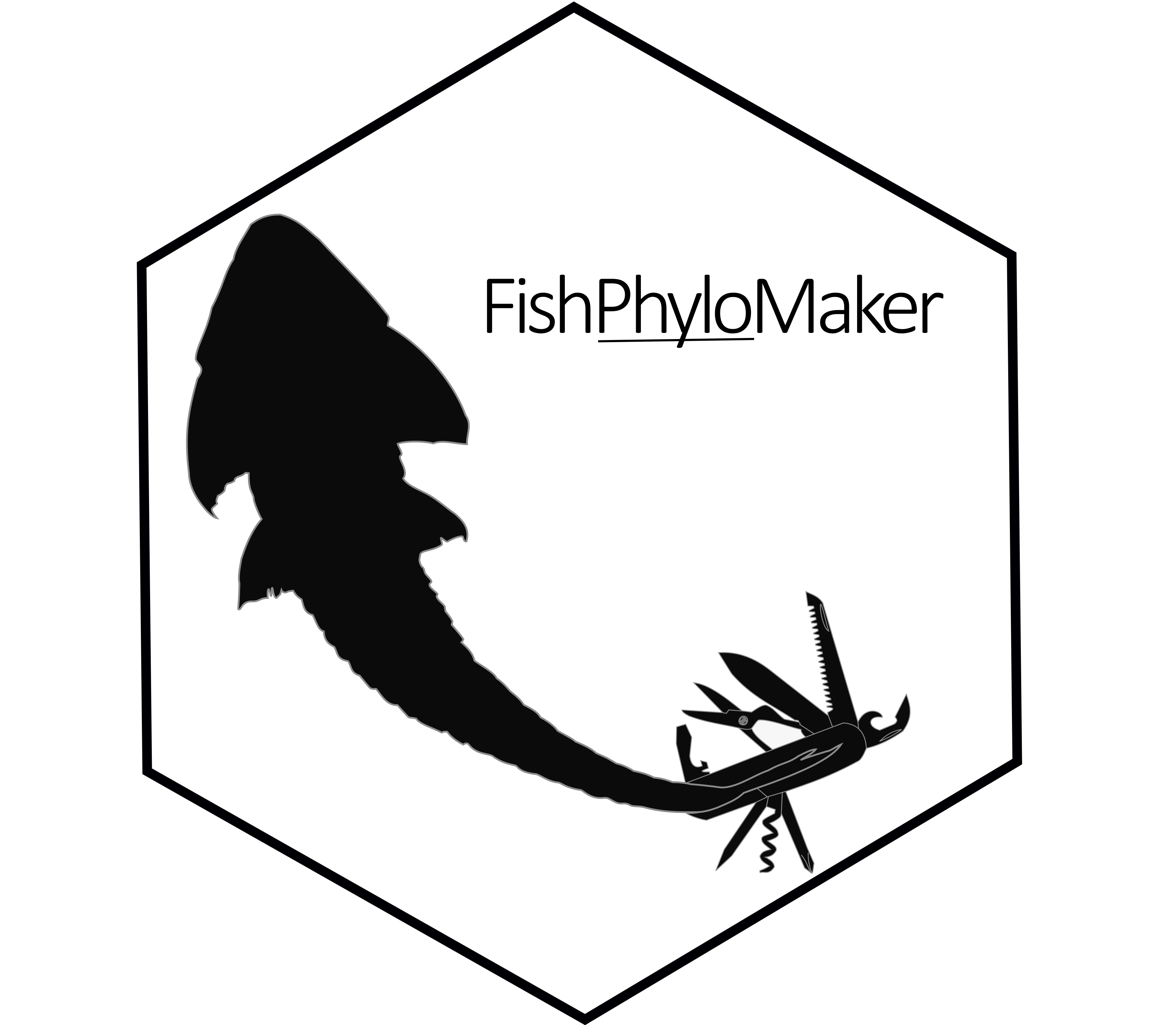Phylogenies for a List of Finned-Ray Fishes.

FishPhyloMaker
{FishPhyloMaker} is an R package that allows to construct synthesis phylogenies for finned-ray fishes. The package has two main functions, FishTaxaMaker and FishPhyloMaker. The first generate a data frame from fish species names provided by the user, checking the validity of these names and possible synonyms by using the information contained in Fishbase database through the package rfishbase. The output of FishTaxaMaker() function is a list containing the following objects:
All_info_fishbase: A data frame containing the taxonomic classification of valid species accordingly to Fishbase;
Taxon_data_FishPhyloMaker: A data frame with three columns containing the valid scientific name of the species (s), its family (f) and order (o). This data frame can be used in
FishPhyloMaker()to generate the phylogeny;Species_not_in_Fishbase: A character vector containing the names of species that was not found in Fishbase with a valid name data frame object containing three columns with the name of species (s), the Family (f) and the Order (o) of all species provided by the user.
Besides to help checking the validity of the names of species, its synonyms and duplicated species, the data frame returned by FishTaxaMaker() in Taxon_data_FishPhyoMaker are formatted so that it can be directly used in the core function FishPhyloMaker(). This function will use the information of the taxonomic hierarchy contained in the data frame returned from FishTaxaMaker(), joint with the information present in the the fishtree of life project to construct the phylogenetic tree.
Installation
You can install the development version from GitHub with:
devtools::install_github("GabrielNakamura/FishPhyloMaker", ref = "main", build_vignettes = TRUE)
Example
To run an example the user can load a data set present in the package:
library(FishPhyloMaker)
data(neotropical_comm)
data_comm <- neotropical_comm[, -c(1, 2)] # removing latitude and longitude
This data set comprises a community matrix with the occurrences of 59 fish species in headwater streams of Parana and Paraguai River Basins, in Brazil. The coordinates of these streams are presented in the two first columns of this data set.
First the user must obtain the data necessary to enter in FishPhyloMaker using FishTaxaMaker function.
taxon_data <- FishTaxaMaker(data_comm, allow.manual.insert = TRUE)
Characidae
Characiformes
Characidae
Characiformes
Characidae
Characiformes
Loricariidae
Siluriformes
Cichlidae
Cichliformes
Crenuchidae
Characiformes
Gymnotidae
Gymnotiformes
Loricariidae
Siluriformes
Loricariidae
Siluriformes
Loricariidae
Siluriformes
Loricariidae
Siluriformes
Heptapteridae
Siluriformes
Characidae
Characiformes
Loricariidae
Siluriformes
Characidae
Characiformes
FishTaxaMaker finds in Fishbase for the family and the order of species provided in data argument. If any species was not find in Fishbase, the user will be asked to type the Family and the Order of this species manually. This function can also be useful to check possible misspelling errors in the name of species.
Finally run FishPhyloMaker
res_phylo <- FishPhyloMaker(data = taxon_data$Taxon_data_FishPhyloMaker,
insert.base.node = TRUE,
return.insertions = TRUE,
progress.bar = TRUE)
The species are inserted in a sequential procedure. Species with any family representatives will be printed in the console jointly with a list of Genus contained of its family contained in the three, so that the user must choose. The user have three options:
- Insert near to a specific Genus: the user must type the name of this Genus;
- Insert between to Genus: the user must type the names of these two Genus separated by a white space;
- Insert at the node that correspond to the Family of the species being inserted: the user must type the name of the Family.
The output has two objects, a phylogenetic tree that can be directly plot with the following code:
plot(res_phylo$Phylogeny, cex = 0.7)
And a data frame indicating at which level the species was inserted (one of the six categories detailed above).
res_phylo$Insertions_data
For more details and updates see FishPhyloMaker web page.
